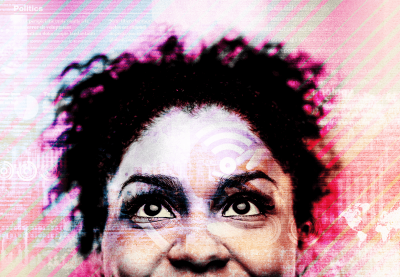Teaching Tolerance Senior Editor Monita Bell hosts our newest podcast, The Mind Online, which explores the critical aspects of digital literacy that shape how we create and consume content online. This podcast addresses what all of us—students or educators, 5 years old or 65—need to know to become safer, better informed digital citizens.
Here, Monita gives us a peek at what listeners can expect from The Mind Online.
Lots of organizations address digital literacy. What does TT have to offer on this topic that others don’t?
That’s a great question. While a number of groups and scholars have addressed digital literacy for years—especially in terms of evaluating sources, determining credibility, detecting bias and things like that—I’m not aware of many who are doing that and talking about equity, justice, power and activism. And with resources for K–12. That’s what TT brings to the table, and that’s rooted in our Digital Literacy Framework. We’ve got K–12 lessons, but we’ve also got professional development to go along with it. And it’s for educators who have wired internet, computers and devices and for those who have none of that. We’re really trying to make sure as many people as possible can access these resources and be able to use them in their classrooms.
Digital literacy is a massive topic. What are you covering on the podcast?
Oh, there’s so much. Of course, we get into “fake news,” but there’s so much more to this podcast and to digital literacy in general. I talk with guests about digital civic engagement, how our brains process information—that’s a fun episode—how search-engine algorithms exacerbate racist stereotypes and hate, and equity issues—from lack of librarians to lack of instructional resources. That’s just a drop in the bucket.
And I think that variety comes from the range of people I talk with. I talk with scholars like Sam Wineburg from Stanford, the principal investigator on a groundbreaking study of how young people conduct internet-based research. He talks about the free tools his group has developed for educators as a result of that research, so people should definitely listen for his breakdown of those materials.
I also talk with people who are working directly in schools, like Julia Torres, who—when she was an English teacher—helped revitalize her school’s library after it had been out of commission for eight years. She’s now her school’s librarian! I love that story. Or Rafranz Davis, who has a district-level position coordinating instructional technology in Lufkin, Texas. She shares firsthand knowledge of what it looks like when administrators and teachers and other staff work together to ensure effective technology-based instruction. I could go on. I’m really excited for people to hear from our guests.
How can people take what they hear on the podcast and use it to enhance their instructional practices?
I mentioned the Digital Literacy Framework earlier. There, we’ve broken down seven key areas where students need help on this topic. Again, not just identifying credible sources, but also using the digital tools at their disposal to get involved and make their voices heard. On the podcast, I speak with Erica Hodgin and Joe Kahne from the University of California, Riverside about this, and TT has lessons that speak directly to this idea.
I also mentioned professional development. We not only have an on-demand webinar that digs into the framework, but we also have a PD module that educators can take at their own pace individually or as a group. And that module really drives home a point that recurs on the podcast, which is that all of us need to bone up on our digital and civic literacy skills, not just young people.
What is something you’ve learned so far that surprised you?
One thing that really stands out is a thing about Wikipedia. For folks like me who were taught that Wikipedia is not a credible source—but then came to learn that it really has a lot to offer because it generally does a good job at citing sources—I was blown away to learn about a tab for every article that breaks down any disputes about that article, how those disputes were addressed and the sources to back it all up. Maybe I’m late to the game, but that really threw me for a loop. And it’s a great thing for teachers to talk with students about because that tab essentially illustrates the timeline for that article’s fact-checking. What’s happening on that tab is what students—and all of us—need to be doing when we look for information. We need to be referencing and cross-referencing. There’s an interview that covers all this on the podcast. Listen out!
You can listen to The Mind Online right here!


0 COMMENTS